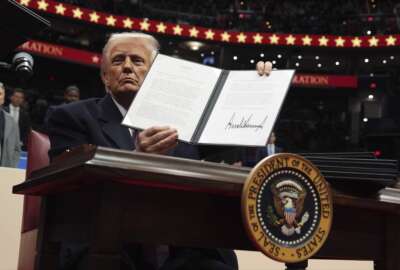Multiple roles more help than hindrance, say agency CAOs
The Government Accountability Office looked at how agencies were complying with the Services Acquisitions Reform Act of 2003. It discovered that while many chief...
wfedstaff | April 17, 2015 4:00 pm
Most federal agencies are required to have chief acquisition officers, high-level politically appointed officials tasked with managing agency acquisition shops.
But many of those officials may only be meeting the letter of the law, according to a recent Government Accountability Office report, which found many CAOs do not actually have acquisition management as their primary duty.
“We found all kinds of combinations and, what we found was that a number of the chief acquisition officers were also other ‘chiefs’ within their departments,” said Bill Woods, a director of Acquisition and Sourcing Management Issues at GAO. “They were the chief acquisition officer, but also the chief information officer, the chief financial officer, some had other titles, like assistant secretary for management. They had responsibilities all over the map.” 
“When we talked to a number of these CAOs who are ‘multi-hatted’ and were performing various responsibilities for the agency, they saw that as a distinct advantage,” Woods said. “When they were responsible for, as the chief financial officer, budgetary matters, they viewed that as an enormous advantage in helping them carry out their acquisition responsibilities.”
Although CAOs charged with multiple responsibilities faced some challenges, those extra responsibilities, Woods said, particularly those involving budgetary resources or providing insight into the human capital structure of the organization, helped the CAOs carry out their acquisition responsibilities more efficiently.
According to the GAO report, CAOs at the 16 agencies studied said they did not face any significant challenges related to the CAO position, such as the level of influence they had within their agencies in regards to acquisitions.
“There were a couple of agencies where the chief acquisition officer thought they should have more influence within their organization, but, by and large, that was not what we found,” Woods said. “We found that the chief acquisition officers were situated within the agencies at a place where they had a tremendous amount of influence over the direction of the agencies. They had a seat at the table.”
While agencies are free to codify the CAOs’ responsibilities through their own internal documentation, Woods said, the Office of Federal Procurement Policy working with the Chief Acquisition Officer’s Council could play a useful role in issuing guidance to agencies about defining the scope of the CAO position.
“This needs to be an agency-by-agency basis,” Woods said. “We’re clearly talking about guidance rather than directives. We’re clearly envisioning a situation where each agency would take into account its own individual responsibilities and situation in coming up with the appropriate guidance.”
RELATED STORIES:
Former OFPP officials say government in state of ‘paralysis’
Services Acquisitions Reform Act (2003)
Copyright © 2025 Federal News Network. All rights reserved. This website is not intended for users located within the European Economic Area.
Michael O’Connell is senior digital editor of Federal News Network optimizing content for the best user experience. Follow @moconnellWFED
Follow @moconnellWFED






